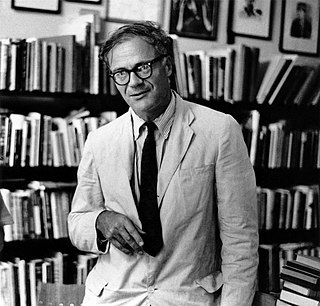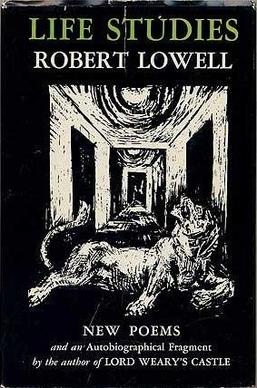
Sylvia Plath was an American poet, novelist, and short story writer. She is credited with advancing the genre of confessional poetry and is best known for The Colossus and Other Poems (1960), Ariel (1965), and The Bell Jar, a semi-autobiographical novel published shortly before her suicide in 1963. The Collected Poems was published in 1981, which included previously unpublished works. For this collection Plath was awarded a Pulitzer Prize in Poetry in 1982, making her the fourth to receive this honor posthumously.

Edward James "Ted" Hughes was an English poet, translator, and children's writer. Critics frequently rank him as one of the best poets of his generation and one of the twentieth century's greatest writers. He was appointed Poet Laureate in 1984 and held the office until his death. In 2008, The Times ranked Hughes fourth on its list of "The 50 greatest British writers since 1945".

Robert Traill Spence Lowell IV was an American poet. He was born into a Boston Brahmin family that could trace its origins back to the Mayflower. His family, past and present, were important subjects in his poetry. Growing up in Boston also informed his poems, which were frequently set in Boston and the New England region. The literary scholar Paula Hayes believes that Lowell mythologized New England, particularly in his early work.
Confessional poetry or "Confessionalism" is a style of poetry that emerged in the United States during the late 1950s and early 1960s. It is sometimes classified as a form of Postmodernism. It has been described as poetry of the personal or "I", focusing on extreme moments of individual experience, the psyche, and personal trauma, including previously and occasionally still taboo matters such as mental illness, sexuality, and suicide, often set in relation to broader social themes.

American poetry refers to the poetry of the United States. It arose first as efforts by American colonists to add their voices to English poetry in the 17th century, well before the constitutional unification of the Thirteen Colonies. Most of the early colonists' work was similar to contemporary English models of poetic form, diction, and theme. However, in the 19th century, an American idiom began to emerge. By the later part of that century, poets like Walt Whitman were winning an enthusiastic audience abroad and had joined the English-language avant-garde.

Alfred Alvarez was an English poet, novelist, essayist and critic who published under the name A. Alvarez and Al Alvarez.
Children of Albion: Poetry of the Underground in Britain, an anthology of poetry, was edited by Michael Horovitz and published by Penguin Books in 1969. According to Martin Booth it was "virtually a manifesto of New Departures doctrine and dogma".
The Faber Book of Modern Verse was a poetry anthology, edited in its first edition by Michael Roberts, and published in 1936 by Faber and Faber. There was a second edition (1951) edited by Anne Ridler, and a third edition (1965) edited by Donald Hall. The selection was of poems in English printed after 1910, which meant that work by Gerard Manley Hopkins could be included. A later edition was edited by Peter Porter.
British Poetry since 1945 is a poetry anthology edited by Edward Lucie-Smith, published in 1970 by Penguin Books, with a second and last edition in 1985. The anthology is a careful attempt to take account of the whole span of post-war British poetry, including poets from The Group, a London-centred workshop that Lucie-Smith himself had once been chairman of, following the departure of founder Philip Hobsbaum.

Ariel was the second book of Sylvia Plath's poetry to be published. It was first released in 1965, two years after her death by suicide. The poems of Ariel, with their free-flowing images and characteristically menacing psychic landscapes, marked a dramatic turn from Plath's earlier Colossus poems.

"Daddy" is a poem written by American confessional poet Sylvia Plath. The poem was composed on October 12, 1962, one month after her separation from Ted Hughes and four months before her death. It was published posthumously in Ariel during 1965 alongside many other of her final poems, such as "Tulips" and "Lady Lazarus". It has subsequently become a widely anthologized poem in American literature.
Nationality words link to articles with information on the nation's poetry or literature.
Nationality words link to articles with information on the nation's poetry or literature.
Nationality words link to articles with information on the nation's poetry or literature.
Nationality words link to articles with information on the nation's poetry or literature.
Paul Mariani is an American poet and is University Professor Emeritus at Boston College.
Peter Davison was an American poet, essayist, teacher, lecturer, editor, and publisher.

Life Studies is the fourth book of poems by Robert Lowell. Most critics consider it one of Lowell's most important books, and the Academy of American Poets named it one of their Groundbreaking Books. Helen Vendler called Life Studies Lowell's "most original book." It won the National Book Award for Poetry in 1960.

Sylvia Plath (1932–1963) was an American author and poet. Plath is primarily known for her poetry, but earned her greatest reputation for her semi-autobiographical novel The Bell Jar, published pseudonymously weeks before her death.

The Dream Songs is a compilation of two books of poetry, 77 Dream Songs (1964) and His Toy, His Dream, His Rest (1968), by the American poet John Berryman. According to Berryman's "Note" to The Dream Songs, "This volume combines 77 Dream Songs and His Toy, His Dream, His Rest, comprising Books I through VII of a poem whose working title, since 1955, has been The Dream Songs." In total, the work consists of 385 individual poems.








